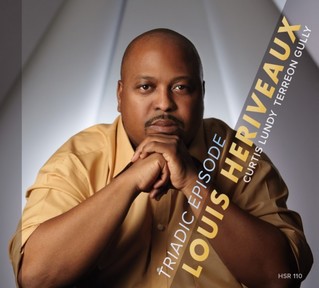
His influences, friends and loved ones are remembered and celebrated on this album and he also re-interprets some of Jazz’s finest pieces. He switches up time signatures on classics and rephrases passages as he bends the music to his considerable will and offers his audience something new and exciting.
The inaugural track on the album is From Day to Day by Mulgrew Miller, one of Heriveaux’s greatest influences. The trio is so well-suited for the music and the direction chosen by Herivaeux. Curtis Lundy is an in-step and crafty bassist and Terreon Gully has been called “a sensitive drummer.” All that is true of both of them and Heriveaux knows how to play to their considerable strengths. All of that is evident from this, the opening track.
The cool swing and the precise phrasing makes this piece something lush and welcome. From the beginning, it is clear that Heriveaux should have been leading his own band for years now. Still, we welcome him whenever he comes.
Gully has some creative moments that make the listener snap to attention while Lundy is straight-up and warm in his choices. A great piece performed well.
Heriveaux follows up the Mulgrew Miller piece with an original of his own, Theme for DosLyn. He wrote the piece in the 90s for an old girlfriend. It has remained a set-piece since. The tune has a fun, little swing (Insert your own joke here) and it is delivered with a smile. Lundy has an understated solo that suits the occasion and the trio carries the piece to the end with tight rhythms and the recurring theme.
Everything I Love is the Cole Porter classic which Heriveaux pulls into an up-tempo rendition with Lundy and Gully coming in hard with a tight drum solo and the song fading out in several full stops. Jazz the way we like it.
One for Simus is remarkably upbeat and optimistic. Heriveaux wrote the piece for a dear friend who was a victim of suicide during the recording of the album. The bass solo carries some of the melancholier motifs but the piano maintains the sweeter melodies. The broken beats of the drums are clearly imaginative of what was happening in the heart of Onesimus. Then the piece begins its outro before coming to a full and sudden stop. The abrupt end was heart-wrenching.
Lundy’s Blues is, of course, by bassist Curtis Lundy. It is a quick blues that is worked over by Gully as the piano and bass work from the outside in.
Body and Soul (Heyman, Sour, Eyton and Green, composers) is a fine showcase for Herivaeux’s most proficient runs for speed while also reminding us of the cool delivery Heriveaux creates. Gully is smooth on the brushes and Lundy takes an equally smooth course on the bass. Still, Herivaeux’s piano work is gorgeous.
Triadic Episode is written by both Lundy and Heriveaux with Lundy writing the first two sections and Heriveaux writing the conclusion. The Lundy section is a bit of warm swing with beautiful melodies and luxurious rhythms Herivaeux’s section taking on a full-blown Blues turn.
The well-known and oft-played Blue Bossa (Dorham, composer) gets a cool time-signature change and Heriveaux makes it his own, as he does every piece he performs. The bass and drums work the new time from cool angles that work hand-in-glove with Heriveaux who makes this piece fresh and fascinating, like it is supposed to be. Love it!
At the Crossroads is a brilliant take on the original. Dig those cool changes from Heriveaux and the righteous bass work from Lundy. Heriveaux’s exquisite phrasings are a wonder. I love the piano work on the last passage.
Jerome Kern’s All the Things You Are is also given a time-signature upgrade. From the familiar standard version, Heriveaux runs it through the 7/4 wringer and the results are fantastic. Gully gives it a little Afro-Cuban twist, as well, and piano and bass work their own magic. The whole trio is just on fire in what was expected to be a rather ho-hum recounting of a classic but is, instead a hot number.
Terreon Gully’s Swing’n Things gets to close out the album. Swing it does. Heriveaux has some excellent episodes in the piece and the rhythm section runs a groove to die for. Lundy’s bass solo is a mellow affair and the trades between piano and drums is a cool conversation.
Heriveaux’s sense of melody and harmony is something extraordinary and deserves all the attention he is now getting and more. Lundy and Gully are perfect partners with Heriveaux and what results is a finely tuned trio effort in Triadic Episodes that calls to the head and the heart in equal voice. Louis Heriveaux has the talent and the heart to make the music that every Jazz fan wants to hear…and should.
~Travis Rogers, Jr. is The Jazz Owl
 RSS Feed
RSS Feed
